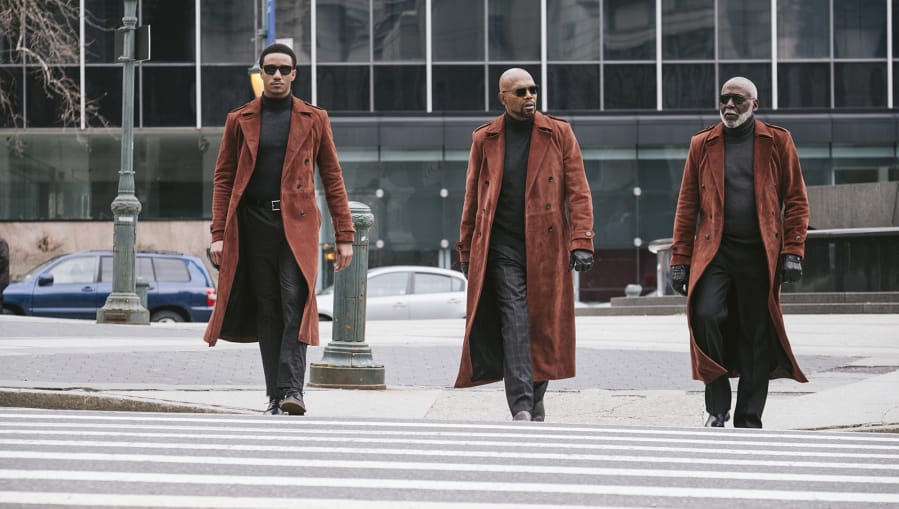In 1971, the gritty action movie “Shaft” offered audiences the sight of a black hero shooting people, flouting social norms and mocking authority. John Shaft, played by actor Richard Roundtree, finally got to do all the things white action heroes had been doing for years.
Now, four decades later, a new “Shaft” aims to put a slightly gentler spin on a boundary-breaking character. It features Samuel L. Jackson in the title role — his second turn, after John Singleton’s “Shaft” film in 2000 — while Jesse T. Usher plays his estranged son, J.J., a deskbound data analyst at the FBI. This version of “Shaft” may be rated R, but it goes for buddy comedy as much as action.
Can you dig it? Audiences will decide when the film arrives in theaters today. Directed by Tim Story, whose past hits include “Ride Along” and “Think Like a Man,” and executive produced by Kenya Barris, the creator of ABC’s “Black-ish,” the new “Shaft” stands on the shoulders of a movie that broke barriers for black representation and helped launched the popular “blaxploitation” subgenre of the 1970s. The question is, can today’s “Shaft” bring that legacy into the future?
“We knew we wanted to pay homage to the original movies,” says Barris, who co-wrote the script with Alex Barnow. “There were things that were done great in the first movie. But that was a different time.”
In 1971 black lead roles were scarce in the movies — and most seemed to go to Sidney Poitier. Throughout the 1960s, he became famous for playing dignified, noble, nonthreatening characters. His performance in 1963’s “Lilies of the Field,” which made him the first black person to earn an Academy Award for best actor, is a good example: He played Homer Smith, a self-sacrificing laborer who builds a chapel for nuns. In 1967 Poitier starred in no fewer than three films with messages of racial harmony: “To Sir, With Love,” “In the Heat of the Night” and “Guess Who’s Coming to Dinner.”
Just a few years later came “Shaft,” an action-crime drama directed by Gordon Parks, a photojournalist-turned-filmmaker. John Shaft was certainly no Homer Smith. He was a New York City private investigator, a wealthy one (he lived in Greenwich Village), though he also moved easily among druggies, gangsters and criminals. With his Afro, leather car coat and swagger — not to mention a sexy-soulful theme song that would go on to win an Oscar for composer Isaac Hayes — Shaft radiated self-confidence, self-respect and street-wise masculinity.
Less impressive are the two sequels, “Shaft’s Big Score!” (1972) and “Shaft in Africa” (1973), but the original film still holds up as a cultural landmark.
“I can sum it up for you pretty simply: ‘Shaft’ was the ‘Black Panther’ of my generation,” says Nelson George, the author of “Post-Soul Nation” and many other books about black culture. For George, seeing “Shaft” at a Times Square theater as a youth — along with his mother and other family members — was a life-changing event.
“To this day I wear turtlenecks because of Shaft,” he says. “I’m reflective of an entire generation of men and women who were taken by that character.”
That generation gets some gentle ribbing in the new “Shaft,” Story says.
“There are more rules, there are more things to look out for today,” he says. “You could take that character and put him in an up-to-date movie. I don’t want to say we make fun of him, but we have fun with his ideas and his values, what he thinks is the way to be a man, what he thinks is the way to protect a woman.” (Regina Hall plays Shaft’s ex-wife; Alexandra Shipp is J.J.’s longtime crush, Sasha.)
By adding Roundtree, who returns as the original Shaft — father to Jackson’s character and grandfather to Usher’s — the movie could pull in a wide swath of moviegoers, says Ronda Racha Penrice, a former film publicist and current member of the African American Film Critics Association.
“What they’re really trying to do is maintain this multigenerational idea of cool,” she says. “And that’s a very attractive thing. You have the original Shaft, the most contemporary Shaft and, with luck, the future Shaft.”



